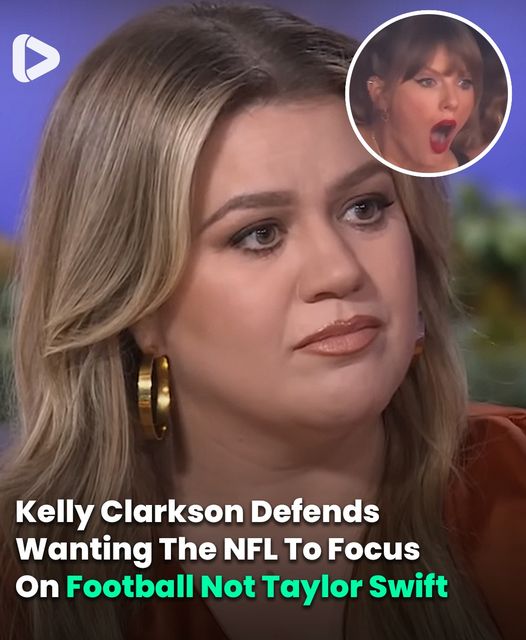Kelly Clarkson has been making waves with her opinion on the NFL’s recent media coverage of Taylor Swift’s relationship with Kansas City Chiefs tight end Travis Kelce. Clarkson, a longtime fan of both sports and music, took a stand by expressing her frustration about the NFL shifting its focus from the actual game to a celebrity relationship. While many enjoyed seeing Swift support Kelce at a few games, Clarkson voiced what a growing number of football fans seem to be feeling: the coverage on Swift’s attendance has been overwhelming and has taken the spotlight away from the players and the sport itself.
Kelly’s Perspective: Focus on the Game
During her commentary, Kelly Clarkson was clear that her comments were not a personal attack on Taylor Swift or her fans. In fact, Clarkson expressed her admiration for Swift as a fellow musician. “I love her,” Clarkson said. However, she made a point that the NFL, first and foremost, should be about football. She suggested that while having celebrities at games can be fun, the attention should always be on the sport. “It’s football,” she stated, emphasizing that people tune in to watch the game, not to focus on celebrity guests.
Clarkson’s words echo sentiments shared by many avid NFL fans who feel that recent coverage has leaned too much on pop culture instead of the athletic performances. For instance, whenever Swift is in the stadium, camera crews constantly cut to her reactions, which some fans find distracting. Even sports analysts have noted how frequently the attention shifts from the game to Swift’s presence, causing some viewers to wonder if this trend will continue or fade once the novelty wears off.

Why Taylor Swift’s Appearance Sparked Such a Buzz
The connection between Taylor Swift and Travis Kelce began when rumors started swirling that the two were dating. Since then, Swift has attended multiple Chiefs games, sparking an instant media frenzy. Coverage of Swift’s appearances at the games, combined with commentary on her relationship with Kelce, became a dominant storyline.
Swift’s fans, or “Swifties,” often bring substantial attention wherever she goes, and her presence at NFL games only magnified that. Media outlets covered everything from what she wore to who she sat with at the stadium. While this crossover of music and sports brought new audiences to NFL broadcasts, it also created friction among long-term football enthusiasts who prefer to keep the focus on the game rather than external celebrity intrigue.

The Role of Celebrities in Sports
Kelly Clarkson’s critique taps into a broader discussion about the role of celebrities at high-profile sports events. The intersection of pop culture and professional sports has existed for decades, but the influence of social media has amplified every celebrity move at sporting events. For example, celebrity sightings in the crowd are often seen as marketing opportunities, helping to draw in audiences that may not have previously tuned into the sport. In the case of Taylor Swift, her attendance at the NFL games may have drawn new viewers, including some of her devoted fans who are unfamiliar with football.
However, this attention can sometimes backfire. Fans of the sport may feel alienated if they perceive that the game they love is becoming overshadowed by celebrity guests. “It’s about balance,” Clarkson remarked, pointing out that there’s room for celebrity appearances at games but not at the expense of the sport itself. Clarkson’s message is clear: while she appreciates what Swift represents, she also believes that the essence of NFL coverage should always circle back to football.
A Broader Reflection of Media’s Role in Sports
Clarkson’s comments also raise questions about how much influence pop culture should have on sports media. Should networks prioritize entertainment over athletic performance? Some would argue that celebrity appearances are part of the entertainment value and that they can help grow the sport’s audience. Others, like Clarkson, suggest that there’s a line where entertainment and sports need to be distinct, allowing athletes to remain at the forefront.
The media’s focus on Swift has undoubtedly driven up viewership numbers, making it a successful ratings strategy. But it has also opened up a conversation about how the NFL, and sports in general, manage the balance between maintaining the integrity of the sport and capitalizing on entertainment-driven narratives. Clarkson’s statements, in this context, are a reminder that some fans watch football for the love of the game itself and don’t necessarily appreciate the added spectacle of celebrity gossip.

Conclusion: Balancing Pop Culture and Football
Kelly Clarkson’s remarks resonate with a portion of the NFL’s fan base that feels strongly about keeping the focus on the game. While many understand the commercial and entertainment value of having celebrities like Taylor Swift at games, they also believe that football coverage should prioritize the players and the sport. Clarkson’s take is neither an attack on Swift nor her fan base, but rather a call for balance in how the media covers NFL games.
As the NFL continues to attract high-profile guests and as pop culture blends further into the sports world, the challenge will be to keep the core of the game intact. Clarkson’s message, “It’s football,” serves as a reminder of what’s at stake for die-hard sports fans who turn on the TV to watch the action on the field.
